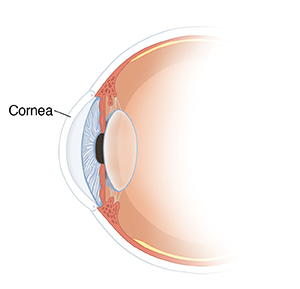Corneal Injury
An eye injury can hurt your cornea. Your cornea is the clear layer on the front of your eye. It protects your eye from dust and germs. And it helps filter out harmful UV (ultraviolet) rays. The cornea also helps to focus light entering your eye. A slight cut or scratch (abrasion) to the cornea can be very painful. A minor scratch can heal in 1 or 2 days. A bad abrasion or a hole (puncture) in the cornea can be very serious. These are medical emergencies.

Something in your eye
If you think you have something small in your eye, flush it with water or sterile saline solution right away. Pull your upper lid out and over your bottom lid. This will help increase the flow of tears across your eye. If these methods don’t work, contact your health care provider. Never try to remove an object from your eye that doesn’t flush out easily with water. Doing so may cause more damage.
When to go to the emergency room
The longer you wait, the greater the chance of injury or infection. Get emergency medical help right away if you have:
-
Severe eye pain.
-
Something in your eye that you can't flush out with water or saline.
-
A very swollen or painful eye after removing an object.
-
A feeling that there is something in your eye that does not go away.
-
Changes in vision.
Call 911
Call 911 if you have:
What to expect in the ER
For minor abrasions
Minor abrasions are often treated with eye drops or ointment. You may be given antibiotic drops or ointment to prevent infection. Most abrasions heal in 1 or 2 days. To help rule out more serious injuries, you may have tests, including:
-
A standard eye exam to check how well you can see
-
A Seidel test, which uses a special dye to look for a hole in the surface of your eye
Depending on the results of these tests, you may be referred to an eye care doctor (ophthalmologist).
For serious abrasions or punctures
You will be referred directly to an ophthalmologist for emergency treatment. An eye specialist is needed to reduce further damage and possible vision loss.
Online Medical Reviewer:
Daphne Pierce-Smith RN MSN
Online Medical Reviewer:
Mahammad Juber MD
Online Medical Reviewer:
Raymond Turley Jr PA-C
Date Last Reviewed:
4/1/2025
© 2000-2026 The StayWell Company, LLC. All rights reserved. This information is not intended as a substitute for professional medical care. Always follow your healthcare professional's instructions.